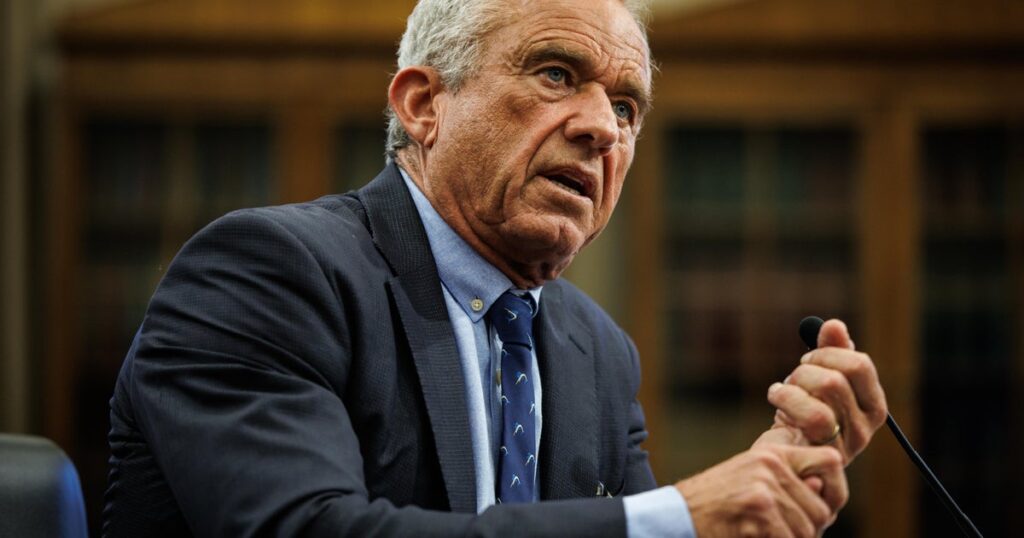In a remarkable show of dissent, over 1,000 current and former employees from the Department of Health and Human Services (HHS) have collectively signed an open letter calling for Secretary Robert F. Kennedy Jr. to resign or be removed from his position. This demand comes amidst a series of controversial decisions and high-profile resignations within the CDC, leaving many questioning the agency’s direction and its impact on public health. Amidst heightened tensions, Kennedy faces calls for accountability as he prepares to testify before the Senate Finance Committee.
| Article Subheadings |
|---|
| 1) Context of the Open Letter |
| 2) Key Issues Highlighted |
| 3) Responses from HHS Leadership |
| 4) Reactions from Former CDC Directors |
| 5) Upcoming Senate Testimony |
Context of the Open Letter
The call for Secretary Robert F. Kennedy Jr. to resign represents a significant moment in the ongoing tensions between health officials and the political administration overseeing health policy in the U.S. More than 1,000 staff members, both current and former, rallied their voices through an open letter that condemns not only Kennedy’s leadership but also the changes occurring within the Department of Health and Human Services. The open letter surfaces during a tumultuous period for the agency, which recently saw the dismissal of CDC Director Susan Monarez and multiple resignations from senior officials. These actions have spurred grave concerns regarding the direction of public health guidance and the overall trust in the HHS.
Key Issues Highlighted
In the letter, signatories criticized Kennedy for “endangering the nation’s health.” They pointedly reference the recent upheaval within the CDC, which has raised alarms about the agency’s ability to effectively manage crucial health issues. The FDA’s recent decision to retract emergency approvals of COVID-19 vaccines for young children was cited as a particularly pressing example of potential negligence. The authors also pointed to the promotion of individuals they deem as “political ideologues” within crucial vaccine approval roles, suggesting that these appointments represent a departure from evidence-based public health decisions. By analyzing the immediate impacts, the signatories argue that the American public’s health is at stake, calling for swift and decisive governance in health policy.
Responses from HHS Leadership
In response to the mounting criticism, HHS Communications Director Andrew Nixon defended Kennedy’s tenure, asserting that he is striving to restore public confidence in a system that has become increasingly fractured. Nixon emphasized that from the beginning of his term, Kennedy has committed to “check his assumptions at the door,” urging colleagues within the HHS to do likewise. This emphasis on evidence-based science, he claims, has led to unprecedented accomplishments in combating chronic diseases within a short span compared to historic health secretaries. Nixon’s defense did little to quell dissent and has been overshadowed by the letters from staff and ongoing public concern regarding COVID-19 management and vaccine approvals.
Reactions from Former CDC Directors
The criticisms also echo through the sentiments expressed by a group of nine former CDC directors, who recently published an op-ed rebuking Kennedy’s management style, indicating that his leadership decisions resemble none that have been observed in the agency’s past. They condemned the recent firing of Monarez, suggesting it “adds considerable fuel to this raging fire” and underscores systemic issues that have arisen under Kennedy. The former directors argue that such drastic measures threaten the integrity of the CDC and damage its longstanding reputation for scientific reliability. Their criticisms contribute to a growing feeling of unease surrounding the agency’s future under Kennedy’s leadership.
Upcoming Senate Testimony
As pressure mounts, Kennedy is scheduled to testify before the Senate Finance Committee on Thursday morning. This appearance is particularly critical, as he will likely face pointed inquiries regarding his leadership amidst the chaos that has enveloped the HHS and CDC. It is expected that committee members will be scrutinizing not only his management style but also the implications of recent health policy decisions. The outcome of this testimony could hold significant weight concerning ongoing bipartisan oversight of health practices at the federal level.
| No. | Key Points |
|---|---|
| 1 | More than 1,000 HHS employees signed a letter calling for the resignation or removal of Secretary Robert F. Kennedy Jr. |
| 2 | Issues cited include vaccine approval changes and staffing upheaval within the CDC. |
| 3 | HHS leadership has defended Kennedy’s record, asserting a commitment to evidence-based practices. |
| 4 | Former CDC directors have publicly criticized Kennedy, calling his actions unprecedented. |
| 5 | Kennedy’s Senate testimony is poised to be a focal point for accountability regarding HHS governance. |
Summary
The unfolding events surrounding Secretary Robert F. Kennedy Jr. and the Department of Health and Human Services underscore a crucial intersection between public health policy and political governance. An open letter from over 1,000 employees expressing a lack of confidence in Kennedy’s leadership brings to light deep-seated concerns within the agency, amplified by recent changes at the CDC. With a backdrop of significant pressures, including a testimony set to occur before the Senate Finance Committee, the ongoing discourse raises critical questions about the future of public health in America.
Frequently Asked Questions
Question: What are the main criticisms directed at Secretary Robert F. Kennedy Jr.?
The letter from HHS employees criticizes Kennedy for jeopardizing public health through questionable vaccine approval processes and for promoting political ideologues rather than scientific expertise within the agency.
Question: How has HHS leadership responded to calls for Kennedy’s resignation?
HHS Communications Director Andrew Nixon has defended Kennedy’s record, stating he is working to restore trust in the CDC and emphasized a commitment to evidence-based science since Kennedy took office.
Question: What implications could Kennedy’s upcoming Senate testimony have?
Kennedy’s testimony could serve as a critical moment for accountability regarding his actions and the subsequent impact on public health policies. The responses he provides may influence ongoing bipartisan oversight and trust in health governance.


